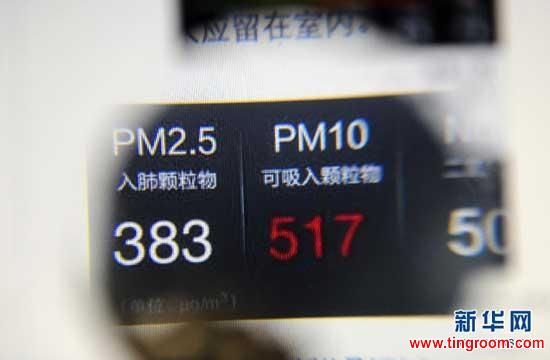CCTV9英语新闻11月:中国2017年降低pm密度(在线收听)
Joining us now is reporter Tang Bo to tell us more about the measures the Chinese government has taken to cope with the air pollution.
Tang: Poor air quality in Beijing and the “Beijing cough” has repeatedly embarrassed the country in the international arena. In the latest example, American Grammy winner Patti Austin was forced to cancel her performance in the city on October the 18th after she suffered from asthma and a respiratory infection. Environmental problems in China have triggered serious policy changes. A 1.75 trillion-yuan (284.2 billion US dollars) plan was sanctioned by the Chinese government in September to tackle the air quality problem. It is aimed at improving air quality within five years, decrease the number of days of heavy pollution and improve air quality in major cities. The government wants to cut the density of inhalable particulate matter by at least 10 percent in major cities nationwide and reduce PM 2.5 by about 25 percent from the 2012 level in Beijing and its surrounding areas by 2017. To better monitor air quality, environmental authorities have set up 668 monitoring spots in 114 cities and release the data daily through media and on the Internet. They also plan to pilot an air quality warning system this month.
 |
| Chinese cities wrapped in haze. |
Zack: China has introduced many measures to cope with the air pollution, and climate change. What are the major challenges the world is facing in terms of cooperation?
Tang: There have been wide-ranging discussions over the world’s two biggest greenhouse gas emitters: China and the United States. The debate is over whether countries need a new impetus to push towards a global deal to curb climate change at the upcoming UN climate change conference in Warsaw. Analysts say as negotiators start hammering out a new 2015 deal to tackle climate change, China is going to set the level of ambition of the agreement. But there are problems, from a lingering economic slowdown across many parts of the world to failure to build a widespread sense of urgency to act on climate change. This means negotiators may struggle to find backing for an agreement that is both ambitious and quick enough to halt the worst impacts of global warming. People have been complaining that the Climate change conversation so far has not been about urgency. Like Qatar last year, Poland’s leadership of the upcoming talks in Warsaw has raised many questions about whether it can drive them forward at the speed required.